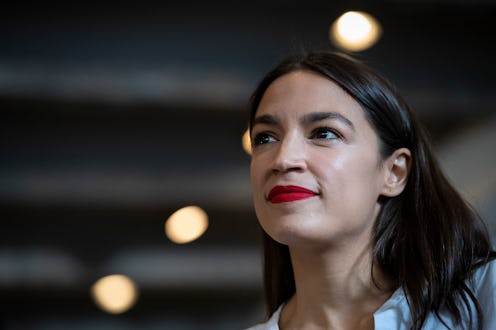News
Alexandria Ocasio-Cortez Said Amazon Pays "Starvation Wages" & The Company Hit Back

Freshman Democratic congresswoman Alexandria Ocasio-Cortez has made it part of her calling card to go after big businesses that prey on their workers, but sometimes the big businesses snap back. Amazon responded to Ocasio-Cortez's claim about "starvation wages," saying that the company adheres to a $15 per hour minimum wage with full benefits for all employees.
In an interview with Johnathan Karl on ABC's This Week, Ocasio-Cortez discussed Amazon CEO Jeff Bezos, saying that the fact that he was a billionaire mattered less than how the company treated its lowest level workers. Ocasio-Cortez was only worried, she said, that Bezos' wealth was "predicated on paying people starvation wages and stripping them of their ability to access health care, and also if his ability to be a billionaire is predicated on the fact that his workers are taking food stamps.”
In October 2018, Amazon announced that it would raise its minimum wage to $15 for all employees in the United States, and it would begin lobbying for a raise in the federal minimum wage, according to The New York Times. So when Ocasio-Cortez made her remarks, Amazon responded.
"@AOC is just wrong. Amazon is a leader on pay at $15 min wage + full benefits from day one. We also lobby to raise federal min wage," Amazon News tweeted on Sunday night.
“We listened to our critics, thought hard about what we wanted to do, and decided we want to lead,” Bezos, said at the time in a statement, per The Times. “We’re excited about this change and encourage our competitors and other large employers to join us.”
Bezos and Amazon might not have made this decision purely altruistically, though, Wired wrote. Besides the political pressure that Amazon faced from Ocasio-Cortez's congressional colleague Sen. Bernie Sanders, they also had a matter of business to worry about. The job market is so strong for potential employees at the moment, according to Wired, that they can afford to pick and choose between the companies that offer the best in return. Amazon needs a hefty supply of seasonal workers to satisfy holiday demands, and the pay raise happened just before 2018's seasonal hiring push.
Amazon's decision to raise its internal minimum wage was certainly a good thing for its lowest paid employees, but at least a few of them have still complained about Amazon's working conditions even since their wages went up, according to The Guardian.
“They overwork you and you’re like a number to them. During peak season and Prime season, they give you 60 hours a week. In July, I had Prime week and worked 60 hours," a Staten Island-based Amazon worker told The Guardian in January. "The same day I worked overtime, I got into a bad car accident because I was falling asleep behind the wheel.” In a statement to The Guardian, Amazon said:
Amazon maintains an open-door policy that encourages employees to bring their comments, questions, and concerns directly to their management team for discussion and resolution. We firmly believe this direct connection is the most effective way to understand and respond to the needs of our workforce. We provide a $15 minimum wage for all US hourly employees, opportunities for career growth, industry-leading benefits, and hands-on training using emerging technology. Associates are the heart and soul of our operations, and in fact, they are also our number one recruiter for new hires by regularly encouraging friends and family to apply for roles. We encourage anyone to compare our pay, benefits and workplace to other major employers across the country.
With its CEO as the current richest man in the world, according to Bloomberg, Amazon also still has the issue of internal income inequality to contend with. In 2017, Bezos made $1.7 million, and the median company employee made $28,500, according to CNBC.